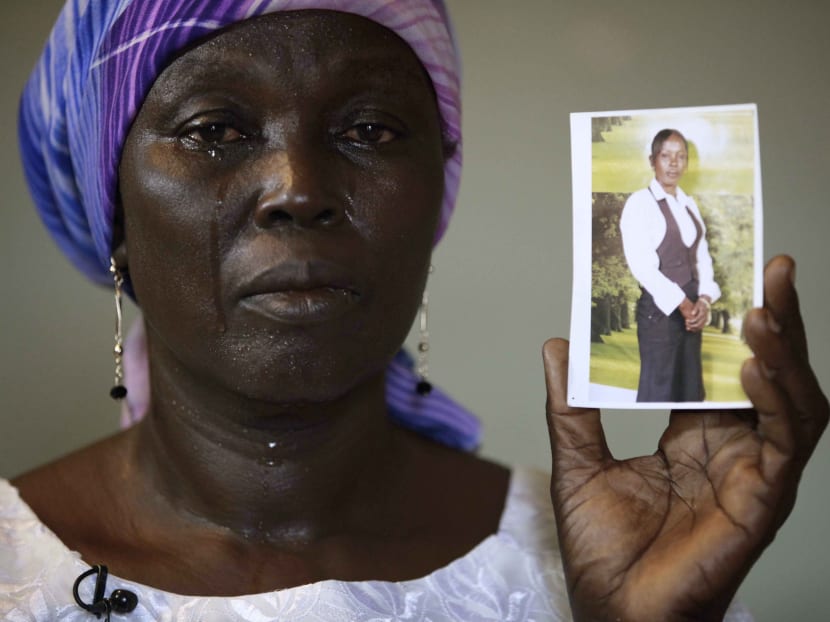11 parents of Nigeria’s abducted girls die
LAGOS — About a dozen parents of the more than 200 kidnapped Nigerian schoolgirls will never see their daughters again.

In this May 2014 file photo, Martha Mark, the mother of kidnapped school girl Monica Mark cries as she displays her photo, in the family house, in Chibok, Nigeria. Photo: AP
LAGOS — About a dozen parents of the more than 200 kidnapped Nigerian schoolgirls will never see their daughters again.
Since the mass abduction of the schoolgirls by Islamic extremists three months ago, at least 11 of their parents have died and their hometown, Chibok, is under siege from the militants, residents report.
Seven fathers of kidnapped girls were among 51 bodies brought to Chibok hospital after an attack on the nearby village of Kautakari this month, said a health worker who insisted on anonymity for fear of reprisals by the extremists.
At least four more parents have died of heart failure, high blood pressure and other illnesses that the community blames on trauma due to the mass abduction 100 days ago, said community leader Pogu Bitrus, who provided their names.
“One father of two of the girls kidnapped just went into a kind of coma and kept repeating the names of his daughters, until life left him,” said Mr Bitrus.
Chibok is cut off because of frequent attacks on the roads that are studded with burned out vehicles. Commercial flights no longer go into the troubled area and the government has halted charter flights.
Through numerous phone calls to Chibok and the surrounding area, The Associated Press has gathered information about the situation in the town where the students were kidnapped from their school.
More danger is on the horizon.
Boko Haram is closing in on Chibok, attacking villages ever closer to the town. Villagers who survive the assaults are swarming into the town, swelling its population and straining resources. A food crisis looms, along with shortages of money and fuel, said community leader Mr Bitrus.
On the bright side, some of the young women who escaped are recovering, said a health worker, who insisted on anonymity because he feared reprisals from Boko Haram. Girls who had first refused to discuss their experience, now are talking about it and taking part in therapeutic singing and drawing — a few drew homes, some painted flowers and one young woman drew a picture of a soldier with a gun last week.
Girls who said they would never go back to school now are thinking about how to continue their education, he said.
Counseling is being offered to families of those abducted and to some of the 57 students who managed to escape in the first few days, said the health worker. He is among 36 newly trained in grief and rape counseling, under a program funded by USAID.
All the escapees remain deeply concerned about their schoolmates who did not get away.
A presidential committee investigating the kidnappings said 219 girls still are missing. But the community says there are more because some parents refused to give the committee their daughters’ names, fearing the stigma involved.
Boko Haram filmed a video in which they threatened to sell the students into slavery and as child brides. It also showed a couple of the girls describing their “conversion” from Christianity to Islam.
At least two have died of snake bites, a mediator who was liaising with Boko Haram told AP two months ago. At that time he said at least 20 of the girls were ill — not surprising given that they are probably being held in an area infested with malarial mosquitoes, poisonous snakes and spiders, and relying on unclean water from rivers.
Most of the schoolgirls are still believed to be held in the Sambisa Forest — a wildlife reserve that includes almost impenetrably thick jungle as well as more open savannah. The forest borders on sand dunes marking the edge of the Sahara Desert. Sightings of the girls and their captors have been reported in neighboring Cameroon and Chad.
In Chibok, the town’s population is under stress.
“There are families that are putting up four and five other families,” local leader Bitrus said, adding that food stocks are depleted. Livestock has been looted by Boko Haram so villagers are arriving empty handed. Worst of all, no one is planting though it is the rainy season, he said.
“There is a famine looming,” he warned.
Nigerian president Goodluck Jonathan insists his government and military are doing everything possible to ensure the girls’ release. The Defense Ministry says it knows where they are but fears any military campaign could lead to their deaths.
Boko Haram leader Abubakar Shekau in a new video released this week repeated his demands that Jonathan release detained extremists in exchange for the girls — an offer Jonathan has so far refused.
After three months, few Chibok residents believe all the schoolgirls will ever return home. AP






